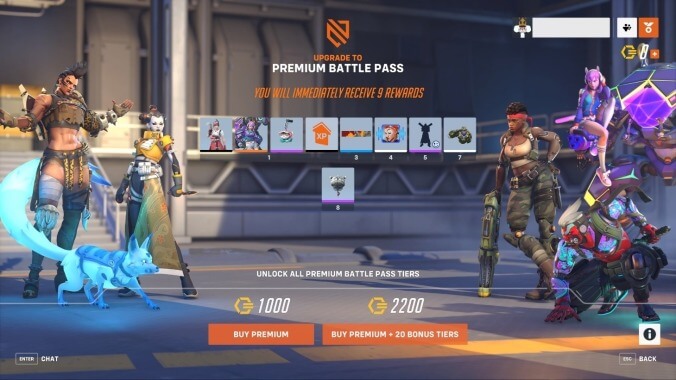Overwatch "2" isn't a sequel—it's a marketing gimmick
It's like the song says: They paved Overwatch and put in a battle pass

Every Friday, A.V. Club staffers kick off our weekly open thread for the discussion of gaming plans and recent gaming glories, but of course, the real action is down in the comments, where we invite you to answer our eternal question: What Are You Playing This Weekend?
How mad must the people making money off of Blizzard Entertainment’s brightly colored, extremely popular online shooting video game Overwatch have been in December of 2017?
That, after all, is the month that Epic Games’ Fortnite released its first “battle pass” monetization scheme, popularizing an idea that had been kicking around on the “How the hell do we get money out of people for ‘free’ video games?” side of gaming for a few years at that point. (A battle pass, for those of you who don’t know because you’re cool, is a subscription plan that grants the players in-game items in exchange for accomplishing certain goals … and shelling out actual money for the initial opt-in. Its genius is both in allowing players to feel like they’re earning unlocks, and creating a sharp sense of FOMO for those who don’t buy in.) In a moment, Fortnite redefined the way free-to-play games pull cash out of their players, codifying a new subscription-based model for doling out cosmetic items that left Overwatch’s “loot box” model—with its ugly reminders of more overt gambling—an instant relic of the past.
Well, rest assured, folks: Blizzard and Activision weren’t going to let that indignity stand. But they couldn’t just completely strip out the lootboxes that powered player progression in Overwatch in favor of some new scheme, right? People might revolt! Blizzard’s eventual solution was far more cunning, though, even if it took a few years to implement: They turned Overwatch off for a day, added a handful of new maps and characters to the ones they’d been steadily rolling out for years, swapped the boxes out for a battle pass, dropped the team sizes from six to five, turned the whole thing back on, and called it Overwatch 2.
That’s a cynical read, admittedly. We’re sure the actual developers at Blizzard could explain to us, in intensive details, all the ways that Overwatch 2 is a true sequel to the original class-based game it has now literally replaced on people’s systems, rather than a retread. But it wouldn’t change the practical realities of logging in to play this “new” title—when and if you can log in to play it, either due to technical issues, or Blizzard’s bizarre decision to cut people on prepaid phones out of their mandatory SMS verification system—and realizing that it’s … Overwatch.
It’s the same gameplay, with 95 percent of the same characters—albeit with a few getting reworked to accommodate the smaller team sizes. (R.I.P. Orisa’s holo-shield; our turtle tactics will miss you.) It’s the same basic art, with a few tweaks. It’s the same highs and lows, that feeling of disparate abilities coming together to achieve something all-powerful, or the sense of getting stomped because you and the randos you got teamed up with could never make it click. The characters remain brightly drawn (if, uh, still questionably designed), with power-sets that are still some of the most thoughtful in the entire class-based gaming sphere. (Also persisting: The moral weirdness of giving even an iota of support to Activision Blizzard after all its recent HR issues.)
In every meaningful way, Overwatch 2 is Overwatch, the same game we’ve been dipping in and out of since way back in 2016. Even the vaunted battle pass is same-y as hell, filled as it is with the same old cosmetics, and a whole host of original Overwatch heroes for new players to resurrect from the dust. (People who shelled out actual money for the first game are grandfathered in to those unlocks, thankfully.) What we have here, then, is not an innovation in video game design, but video game marketing. After all, if games are going to become these permanent institutions—steadily updating, retaining as many players as they can for years at a time—then why should they have to also give up the flashy appeal of coming out with something new and fresh with a 2 in the name? (Even if the actual offerings are decidedly warmed over.) It’s a triumph, honestly—just not in a way that’s actually going to mean much to actual players.